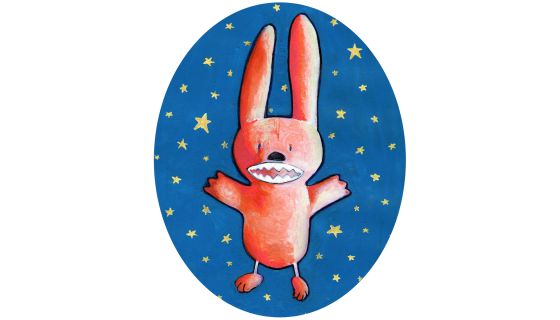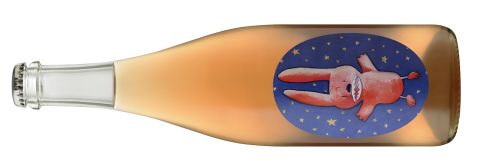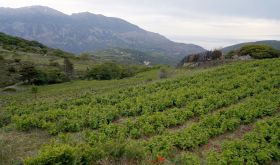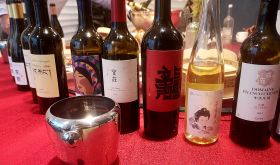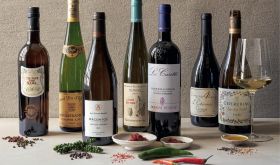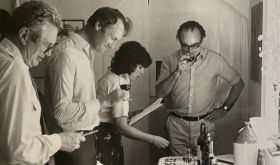From AU$38, HK$230, £26.50, $34.98
When Tim Wildman MW found out last month that The Wine Society were going to start selling his South Australian pet-nat Astro Bunny in the UK, he was tickled pink.
‘I’m going to get such a kick out of seeing my stupid little bunny on a Wine Society mailout’, he told me when I caught up with him in Melbourne in mid March to taste it.
The Wine Society is no slouch when it comes to listing good, non-mainstream Australian wines, of course. But this particular wine is so far out of the mainstream – a cloudy, no-additions blend of Zibibbo, Fiano, Arneis, Nero d’Avola and Mataro – I can see why Wildman is amused by the idea: a venerable wine-trade institution with almost 150 years of history selling a wine with a cartoon of a stoned rabbit on the label.
Wildman is now based in the UK but has a long connection with Australia. Before the pandemic he led regular wine-trade tours Down Under through his James Busby Travel business, and a decade ago, as a buyer for Les Caves de Pyrène, he imported wines from the then-emerging clique of cutting-edge Australian natural winemakers.
Wildman made his first pet-nat in South Australia in 2014, starting with a tonne of grapes and borrowed space in a mate’s winery. Since then, working with various growers in various regions (in 2021 the grapes were from the Adelaide Hills, McLaren Vale and the Riverland), and moving from winery to winery, he has built production to a fairly serious 33 tonnes (around 30,000 bottles) for the 2022 vintage.
‘What I want to do is make pet-nat that’s clean, fruity, fault-free, and delicious’, he says. ‘To do that, if you’re not adding anything during the winemaking (no acid, no SO2), you need to work with fruit that is naturally low pH. And that inevitably led me to working with southern Italian varieties.’
Half of the blend, he says, consists of white grapes picked at around 10.5 Baumé, to provide a neutral, crisp, clean base. On top of that are layered the Nero d’Avola and Mataro for fruit weight and a touch of colour, and a big slurp of Zibibbo (aka Muscat Gordo Blanco in Australia, Muscat of Alexandria elsewhere) – sourced from old vines grown in the Riverland – given 24 hours’ skin contact for perfume and spice.
The combination works extremely well. The wine is bursting with really enticing, peachy aromas – evoking a well-made Bellini – and, despite being bone dry, is irresistibly grape-pulpy on the tongue, with an echo of sweetness (the Zibibbo doing a lot of heavy lifting here). There’s a well-judged level of persistent, gentle fizz carrying through to the last sip. So many pet-nats are gushy up-front and fail to follow through, but this isn’t too eager to please, and continues to deliver.
Wildman, who promises online ‘potable beverages, mostly harmless’, has a good following for his pet-nats in Australia, but only a third of the production is sold here. The rest is exported: as well as being available in a few UK outlets (via importer Indigo Wines who sell direct via The Sourcing Table and have also sold this wine to Clapton Craft in London, Seven Cellars in Brighton, Shop Cuvee, Forest Wines, Highbury Vintners, The Sampler and Natty Boy Wines).
Astro Bunny and its pink stablemate Piggy Pop (a good wine but not as deliciously appealing), can also be found in other parts of the world. They are imported by Vine Street in the US, Metrovino in Alberta, Lieu Dit in Denmark, RAW Imports in Singapore, La Cabane in Hong Kong and Wine Diamonds in Japan (although not all the shippers have the 2021 vintage wines in stock at the moment).
On his website Wildman also promises ‘my alter ego hangs out at www.pet-nat.com where you’ll find heaps of winemaking geekery’. A must for wine students? Speaking of which, Wildman set up the free WineTutor.tv for MW students back in 2015.
See Ali Cooper MW's tasting note on the 2018 from 2019 and Jancis's tasting note on the 2021, showing that this wine has real consistency.

